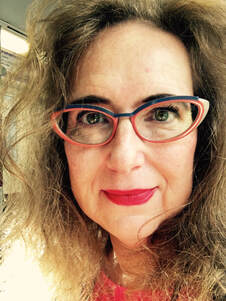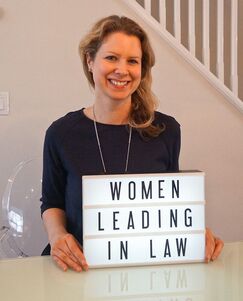 I'm so glad I restarted this series. The profiles are rolling in and I am learning so much already! This post features Anita Szigeti and her practice in a really interesting area of law: mental health law. 1. Tell me a little about your practice or business. My firm is called Anita Szigeti Advocates (“ASA”!). We are an all woman firm. I have a junior associate lawyer, an articling student and a legal assistant. Our firm is also diverse and has been for many years devoted to all aspects of diversity, including employing racialized young lawyers and internationally trained lawyers. All our work is in the area of mental health law. Everything we do is related to mental health issues. There are two broad branches: mental disorder law in criminal justice and mental health issues in relation to civil commitment or forced treatment. We are true barristers in that all our work is litigation and we are in hearings pretty well every day and often all day. We appear before administrative tribunals addressing liberty issues. There are two of these: (1) The Ontario Review Board that considers the situation of forensic accused persons who are unfit to stand trial or have been found not criminally responsible on account of mental disorder for their criminal charges; and (2) the Consent and Capacity Board which deals with involuntary civil commitment, treatment capacity, long term care placement, capacity to manage property and related issues. We do appeals from both tribunals so we spend some time in the Superior Court of Justice and I spend a lot of time on my feet arguing cases in the Court of Appeal for Ontario. I have also appeared in the Supreme Court of Canada ten times. The other thing we do is act for intervener groups in all kinds of settings, including public interest intervention at Coroner’s Inquests. These are lengthy death inquiries with a jury who get to ask questions throughout! I have done probably 20 or more Inquests, including some that went on for many months. They fall into two broad categories: inquests into the deaths of individuals who are killed during their interaction with police and inquests into institutional deaths, often by suicide or medication adverse consequences or overdose. 2. Why did you go to law school? I wish I had a good answer here. I don’t. I had intended to become a doctor, like my mother. This was the plan since I was a little kid. However after two years of undergrad, I got very sick and nearly died. I ended up in hospital for the better part of a year having three major operations. I was not allowed to eat or drink during this time and I literally had nothing to do. So my then boyfriend gave me a practice LSAT book and I just kept doing those tests. At the end of the year, on almost a lark, I wrote the LSAT and all that practice paid dividends; I didn’t miss a single question. This meant I got accepted to the U of T law school and even got a small scholarship. There were no lawyers in my family and I had no idea what one did. However, I didn’t want to become a doctor after being so sick, so I figured I’d go to law school and find out what that was all about. Never really intended to practise, just pass some time. I was 20 when I started law school. The ultimate irony here, of course, is my law practice now takes me into hospitals every day for hearings. 3. How did you get to where you are today? Design? Chance? Both? I fell into the practice of mental health law completely fortuitously. I began initially as a Hungarian speaking lawyer (I am perfectly bilingual and that’s rare in our profession) servicing the ex-pat community doing Wills and Real Estate and Family Law. It was a disaster. I was truly terrible at the solicitor’s work and was slowly starving to death, barely making rent. I was also unhappy. But I had no idea how to get out or what to do. I was completely on my own, isolated from the whole profession, before social media! One day a friend from law school who was working as a Patient Advocate inside what is now CAMH on Queen Street suggested I represent a patient at a Consent and Capacity Board Hearing. I was resistant but he was persistent. The very first hearing I had the client was involuntarily detained, but so far as I could tell had not done anything wrong. She was ill but on what basis was she effectively incarcerated? I could not make sense of any of it. I did my first hearing advocating for her release and never looked back. I instantly felt like this was what I was meant to do. Eventually, in hind-sight, a lot of my earlier life-experiences definitely had prepared me for exactly this kind of work. I had just never thought it was an area of law at all and wasn’t able to see the synergies there. However, I was deliriously happy representing vulnerable detained people and taking on the psychiatric profession, standing up tall for the client, levelling the power-imbalance in the room. Within that year I opened probably about a hundred such files. Over the next 10 years I opened 250-300 of these types of files each year. At some point I began representing people in related proceedings but where those with mental health issues came in to systems through criminal justice. I think this was because many of my regular clients were becoming criminalized. I was even more hooked by defence work. I fell in love with criminal defence lawyers as a group, because they are big-hearted, sharp-tongued and have the darkest humour. I started actively participating in the Criminal Lawyers’ Association (CLA), was elected to its governing body and continued leading various other volunteer organizations and groups. Somewhere in this journey, I realized I had become known for the work I did and was what I like to call a ‘big fish in a very small pond.” That suited me. I am not someone who likes to know a bit about a lot of things. I do like being the best at one thing, even if that thing is so small, most people have no idea what it is. It is my thing. 4. What is your most significant achievement? What are you proud of? I suppose the logical answer would be a case I won in 2003 where I had been appointed amicus curiae in the Supreme Court. The case, known as Starson v Swayze, became a landmark decision and some people say changed the test for capacity to make treatment decisions. But that would not be my answer, though it is certainly a career highlight and winning is sweet. Oddly, if we are talking about professional highlights, I am most proud of the work I did on cases that were lost, and indeed lost brutally badly at times. I can think of two quick examples. In 1999 I was counsel to the then Queen Street Patients’ Council and the Toronto Rape Crisis Centre who wanted jointly to intervene in the Inquest into the death of Cinderella Allalouf, the sole female patient on a medium secure forensic unit at Queen Street (now CAMH) who got pregnant on that unit and died in childbirth. The Coroner denied the coalition group standing. We had about 48 hours to put together materials to bring a judicial review to Divisional Court. I remember we were working with the clients all night, then there was a huge snowstorm at the end of April and we had to run through it to serve people outside the Courthouse. My written and oral submissions were among the best in my career. I was in that ‘flow’ state Olympic athletes describe. We lost so bad. Precedent setting case law was made against coalitions of this nature. It was a disaster. I nonetheless remember it as some of the best work I have ever done and among the most meaningful. I have a similar recollection of representing an intervener group in the Supreme Court in a case called CLA v AG in 2012. I did my best work on my feet for those 15 minutes. I left it all in the Courtroom after re-writing my argument IN court based on what was going on around me. Huge loss. Disaster for the defence bar. Have never even read the Judgment. But when I remember how I felt arguing the case, how certain I was that the argument I was making was the right one and how important the case was to the administration of justice, I know I could not have done more. That’s what I am most proud of. Moments like that. Cases where I am completely committed and giving it my all to try to achieve justice for people who otherwise have no voice. It’s a privilege. 5. What are some key challenges, and more importantly, opportunities for women in law? I think the good news is that opportunities outweigh the challenges. There definitely are challenges, however. To this day, despite that I am 28 years at the bar, I get belittled and cut off and yelled at, dismissed and abused usually by people in positions of authority who are clearly threatened by forceful advocacy in front of them. I suspect, but can never know of course, that being a woman is part of the reason for the shabby treatment. I do not imagine, but also cannot know for sure, that men in my place experience the same level of disruption while just doing their jobs. Certainly I do not see men who are lawyers in my proceedings being shouted down like I so often am. This is very difficult. It is an extreme challenge because our civility rules really do not permit us to speak our minds in such situations so one has to be very careful to maintain respect for the tribunal and civility at all cost. This requires much tongue biting. Now for the good news: there is a great lot of room for women to become decision-makers. There is an urgent and desperate need for women to become tribunal adjudicators and in Ontario there are 150 or more such agencies. Many are still largely staffed by men, older and white men at that. There is so much space for women to occupy. In addition, of course, to applying to be appointed to the Bench, tribunal adjudication and also politics are great places to use a law degree effectively. The administration of justice benefits from increasing numbers of women in decision-making positions. I would encourage any woman who has any desire to be on that side of the equation to do it. In my experience women make sensible compassionate decisions. Women make fabulous leaders. We should aim to be in positions of power and agents for change at the highest levels. We should and must become leaders. We should not be satisfied to be part of the "team". This goes for various volunteer organizations as well. The CLA is a good example. It has had but a couple of Presidents who were women. While more women are on the Board, they can’t seem to rise straight to the top. That’s unfortunate and real change needs to happen. This means women actively seeking those positions as Chair, President, dare I say Prime Minister? 6. What advice would you give a woman starting her legal career? The main thing is exuding confidence. “Fake It till you make it” I have always found useful. Whatever you do, act like you know what you’re doing. Particularly within the law, hesitation, reluctance, uncertainty about your position all telegraph weakness and in a litigation environment, that’s fatal. The natural confidence comes from knowing your case. From working extra hard. Being more familiar with the facts and the law than anybody else in the room. Regardless of stereotypes or prejudices, competence can’t be entirely dismissed after a while. Success is within your grasp if you’re smart. The other thing is, and this takes some comfort and probably comes with experience and time, but if you can inject humour into anything, people remember that and they remember you. It is what draws people in and it is how they learn. Finally, find mentors who care about you and are generous with their time and their expertise who also care deeply and passionately about what they do. If you find someone who is prepared to take you under their wing, you will never feel totally alone, which is the scariest thing when you are starting out. The way to find your perfect mentor is identify someone you admire and offer to help her. Don’t ask her for coffee. Ask if you can write a paper for a conference she’s organizing or help her organize a CPD event for her bar or do some research or document summary for a big trial. Ask if you can help. Ask how you can help. And in the end, before you know it, you’re being helped too. Maybe you’re hired. Or you’re working together some other way and connected to the broader bar. And with any luck, you’re having fun and learning. I elaborate a lot on this in the podcast I did with Sean Robichaud as part of his “Of Counsel” series. If you feel like it, give it a listen. I am super proud of this too. ------------------ Thank you Anita for sharing with us your experiences leading in law, I learned so much! Stayed tuned for more posts and inspiring advice. The "Women Leading in Law" series focuses on good news stories and highlights amazing women succeeding in the legal profession. Each post includes the profiled lawyer's answers to six questions. Prepare to be inspired! ICYMI - previous posts profiled the following amazing lawyers: Neha Chugh, Christy Allen & Nancy Houle, Suzie Seo, Kim Gale, Alexi Wood, Melissa McBain, Erin Best, Gillian Hnatiw, Melanie Sharman Rowand, Meg Chinelo Egbunonu, Lisa Jean Helps, Nathalie Godbout Q.C., Laurie Livingstone, Renatta Austin, Janis Criger, May Cheng, Nicole Chrolavicius, Charlene Theodore, Dyanoosh Youssefi, Shannon Salter, Bindu Cudjoe, Elliot Spears, Jessica Prince, Anu K. Sandhu, Claire Hatcher, Esi Codjoe, Kate Dewhirst, Jennifer Taylor, Rebecca Durcan, Atrisha Lewis, Vandana Sood, Kathryn Manning, Kim Hawkins, Kyla Lee, and Eva Chan.
2 Comments
4/28/2020 09:21:52 am
A fabulous way to start the week -- two fantastic interviews in a row. Including yesterday's interview with Neha Chugh. Well done. These should be passed around to paralegal students. Thank you.
Reply
Erin
4/28/2020 09:36:46 am
Thanks Bob! I agree, they are very inspiring posts. I am so glad that these women are taking the time to participate.
Reply
Your comment will be posted after it is approved.
Leave a Reply. |
Erin C. Cowling is a former freelance lawyer, entrepreneur, business and career consultant, speaker, writer and CEO and Founder of Flex Legal Network Inc., a network of freelance lawyers.
Categories
All
Archives
June 2024
|
|
(C) 2014-2024 Cowling Legal. All rights reserved.
|
Please note I am not currently practicing law.
Information on this website does not constitute legal advice and is for informational purposes only. Accessing or using this website does not create a solicitor-client relationship. See website Terms of Use/Privacy Policy. |







 RSS Feed
RSS Feed
